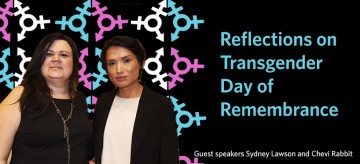Story by Andrea Johnson, Equity and Inclusion Office
A wide variety of questions were discussed at this year’s commemoration of Rule Out Racism; a week-long series of events, held from March 21-24, engaging conversation and literacy around race and racism within the UBC Okanagan community. How can we decolonize the University? What is the lived experience of queer, African, migrant youth in the city of Winnipeg? How can you build a community of anti-racist allyship? Is racism in Hamilton different than racism in Kelowna? Each was discussed with lively commentary, and critical thinking made possible through the honest, and generous participation of those who attended. But how exactly did this event come together, and what does it mean for the campus community?
The event is a true collaboration of community partners, faculty, staff, and student groups coming together to incite dialogue around race, and racism with the intent to create a culture of anti-racism on campus that extends beyond our campus footprint to the wider community. Hosted by the Equity and Inclusion Office in partnership with the Rule Out Racism committee, and contributions from other various groups, this year’s event aimed to provide opportunities to engage critically and creatively with some of today’s most pressing issues.
So if you didn’t notice the posters, social media posts, or your friends’ invites, this is what you missed at Rule Out Racism 2016!
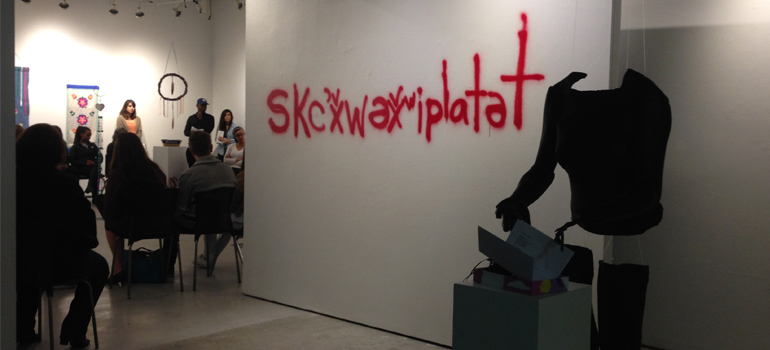
Privilege Project and Art Exhibit in the FINA Gallery
On March 7, a collaborative art project entitled “They Coloured Me” was unveiled at the FINA Gallery as a precursor to ROR week later in the month. Three groups joined together to present an interactive art exhibit examining the status of social privilege; the Qu(e)erying Campus Project (Diversity Project), “They Coloured Me” art exhibit hosted by the Indigenous Students Association and the Privilege Project. Each exhibit incited unique dialogue amongst the attendees, yet it was the true representation of diversity and the space made for dialogue within this assemblage that was the most impactful.
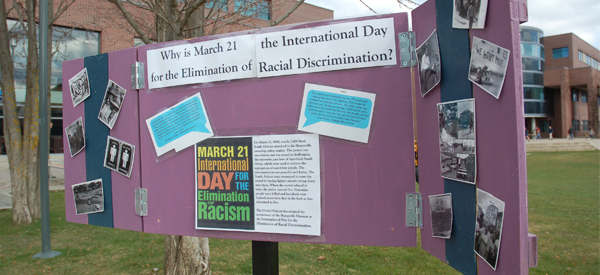
Rule Out Racism shutters in the courtyard
Throughout the week of March 21-24, the Shutters Project was on display in the courtyard serving as an interactive display for students to engage with as they passed through. Each of the sixteen shutters featured content regarding aspects of race, and racism such as ‘What is White Privilege?’ or ‘The History of Residential Schools in Canada.’ The project serves to cement the presence of Rule Out Racism Week on campus, as well as having the goal of reaching as many individuals as possible in becoming aware of the issues.
A panel discussion with respect to Indigenizing and decolonizing the University launched ROR week on Monday afternoon. Co-organized and hosted by the AlterKnowledge Centennial Series (FCCS) and the Indigenous Studies program (CCGS), the two-hour gathering featured three panelists, Creative Studies lecturer Tannis Nielsen, PhD candidate and children’s book author Nicola Campbell, and MFA student Amberley John. All three women shared their knowledge from a medium that was closest to them; Amberley displayed her art to share her healing process, and Nicola, her stories. The entire event was an encouraging demonstration of the important work being done on campus by Indigenous scholars and artists to deconstruct the presence of colonial structures that are embedded within the institution.
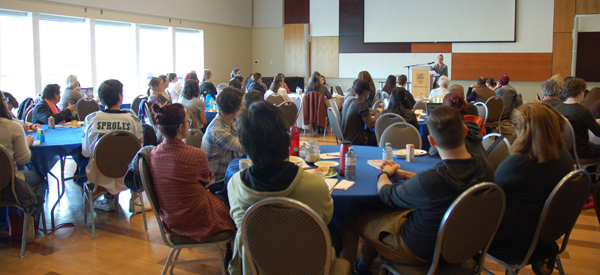
Panel Discussion – Indigenizing the University. Decolonizing the University
Tuesday accommodated two viewings of the multi-media presentation “I’m New Here: Migration, Sexuality, and Racism”: an on campus viewing during the day, and an evening show at the Vernon branch of the Okanagan Regional Library. The photo-voice project followed several young, queer, African migrants living in Winnipeg, using animated short films to tell their stories. Presenter, Irene Fubara-Manuel flew in from London to share her research placing the spotlight on the fetish of black masculinity within the queer community, and the stereotypes that many migrants are confronted with upon arriving in Canada. Irene’s work is one piece of lead researcher Susan Frohlick’s larger research project on racialization within HIV/AIDS discourses in Canada as they pertain to Black, Caribbean, and African populations, funded by the Canadian Institutes of Health Research. Frohlick stresses the importance of the research, “Irene’s work clearly demonstrates the insidious and multi-faceted experiences of racism and racialization for queer African immigrants in Canada, from an up close and intimate perspective.” Making the most of her time at UBCO, Irene continued to attend all of the ROR events during the week, and generously shared her perspective on many of the topics.
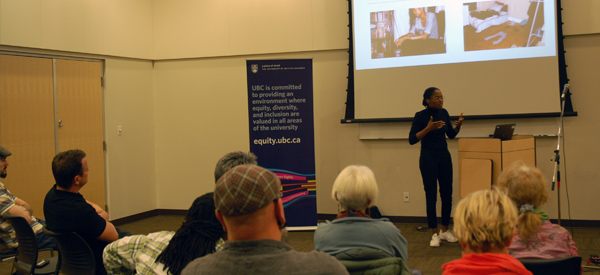
“I’m New Here” presentation by Irene Fubara-Manuel at the Vernon Library
This month’s Tea Talk, hosted by the Women’s Resource Centre, featured a moving discussion around “The Politics of Hair.” Participants continued to flow into the Aboriginal Collegium during the two-hour talk, and under great facilitation by WRC Co-coordinator, Siona Koker, it was an engaging event to learn from, and participate in. Offering a space for participants to reflect on the way that hair has been politicized by race incited moments of deep reflection, and even healing.
An activity was presented to the group, where participants had to guess whether women in photos were wearing their natural hair, or a weave. After acknowledging that it can be an uncomfortable decision to make, Siona reflected that our selections were based on what is perceived to be ‘good and desirable hair’ based on a hierarchy tied to the racist structures of colonialism – a theme that was present throughout the entire discussion.
Later that evening, the UNC theatre was home to “Colours of Resistance,” a screening of funny, and provocative short YouTube clips, followed by a feature 30-minute documentary on Racism in Hamilton with the film’s director, Ismäel Traore in attendance. Dr. Ruthann Lee, who moderated the discussion, emphasized that in the fight against racism, we must celebrate the voices of Indigenous peoples and racialized communities who use humour and creativity to resist. With discussion continuing late into the evening, it was a demonstration of the intimacy around how these issues touch so many individuals on our campus.
With thoughtful discussion throughout the week highlighting the problem of racism in our community, the final workshop on Thursday afternoon, “Building Anti-Racism Allyship” provided participants with tangible skills to turn dialogue into action. Co-facilitators, Lucia Woolgar and Foluke Ogunyannwo gave participants scenarios of racist micro-aggressions, and as a group we came up with solutions for handling each of the encounters. As we debriefed the workshop, it was apparent that there is so much to be learned from one another in how to handle these tough situations.
Overall, as my first Rule Out Racism week with the Equity Office, and at UBCO, I am amazed with the amount of talent, dedicated work, and active participants that we have here on our campus. It is a real testament to the commitment we have for raising awareness about racism and the collective commitment for change.
On behalf of the Equity and Inclusion Office, I’d like to thank: ROR committee, Women’s Resource Centre, Indigenous Students Association, Pride Resource Centre, IKBSAS, UBCO Library, Okanagan Regional Library, Faculty of Creative and Critical Studies, Canadian Institutes of Health Research, Community, Culture, and Global Studies, UBC Vancouver’s Equity and Inclusion Office, University Relations, and our social media fans. As well as the students, staff, faculty, and community members who attended the events, who shared their voices, stories, and time to help make this a meaningful week.
